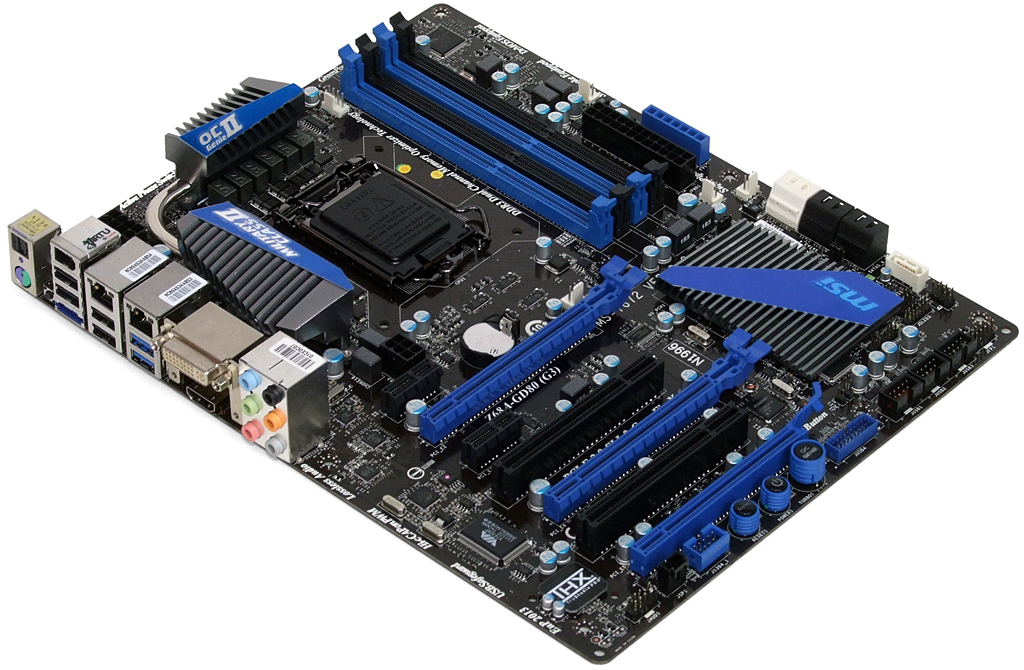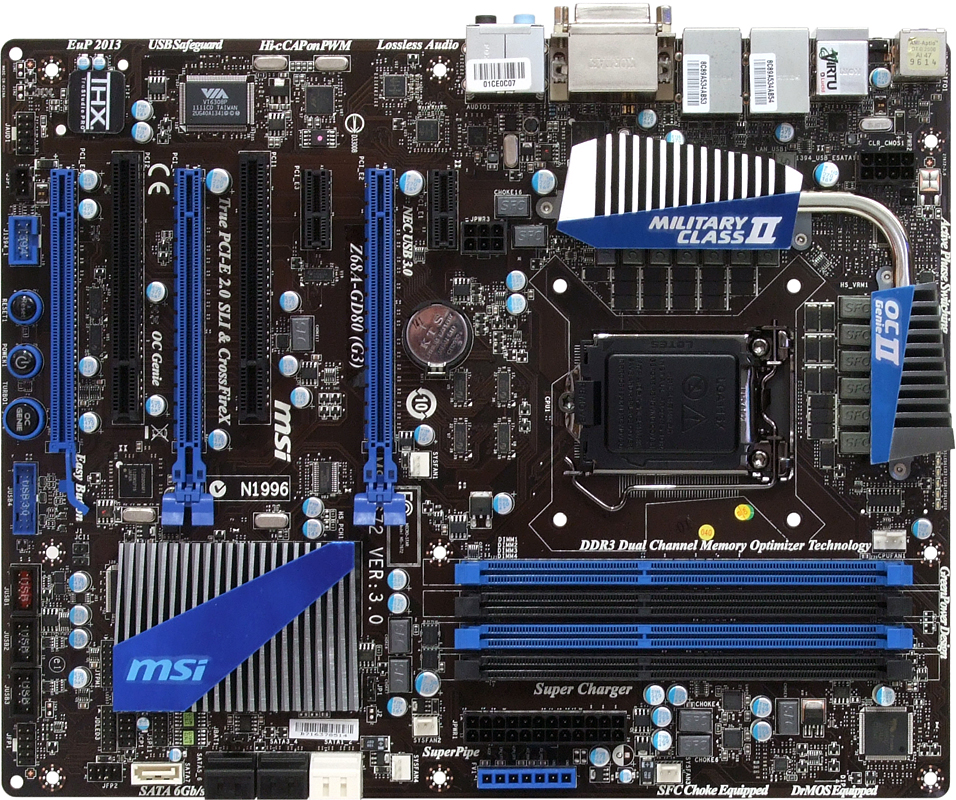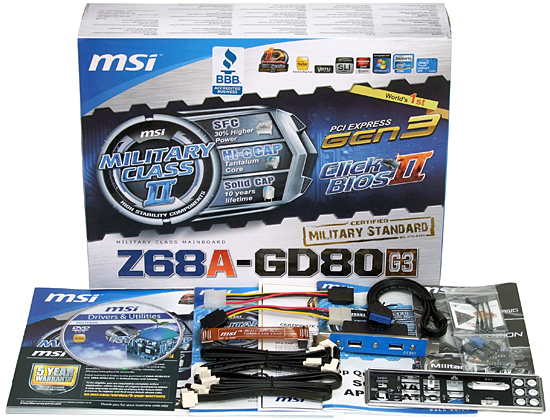Round-Up: Four Z68 Motherboards From $220 To $280
A real enthusiast chipset deserves a real enthusiast motherboard. Today we're comparing four feature-packed platforms that most folks who call themselves hardcore (and informed enough to know what hardware meets their needs) can actually afford.
MSI Z68A-GD80 (B3)
Spoiler alert: MSI’s Z68A-GD80 targets value-minded enthusiasts by being the least-expensive product in today’s round-up. Consequently, it sits across from ASRock, which sought to provide the greatest number of features in today’s round-up.
That’s not to say the Z68A-GD80 is a stripped-down product. In fact, it includes twice as many gigabit Ethernet and USB 3.0 controllers as Gigabyte’s competing model. MSI also adds a DVI output, though we're not sure of its value to enthusiasts (who are less likely to tap into Intel's HD Graphics engine than mainstream or business buyers).
MSI loves to point out that it is the only company to support PCIe 3.0 on both of its CPU-supported x16 slots. Of course, you’ll need to wait for next-generation LGA 1155 CPUs to enable that feature, and even then we have our doubts about important this functionality will be in near-term products. Adding a second card to the middle slot still causes transfers to drop from x16/x0 to x8/x8 modes, so MSI is relying on the new technology to keep the bandwidth of its two x8 slots equal to the two PCIe 2.0 x16 of some higher-priced competitors (such as ASRock’s Z68 Extreme7).
While we could argue either way about the value of doubling lanes or enabling PCIe 3.0, we have to acknowledge that this board is limited to two-way SLI. While three-way CrossFire is technically possible, its third x16 slot wired with four lanes isn’t optimal for the task. Assuming all 20 Gb of the chipset’s DMI went to a third graphics card, there would be nothing left for other devices on the PCH, such as drives, network controllers, or USB.
This brings us to where we left off in the discussion of Gigabyte’s sacrificed features, only this time its not the PCIe x1 slots in peril. Instead, anyone using the third PCIe x16 slot in x4 mode must be willing to sacrifice the Z68A-GD80’s 88SE9128 SATA controller (two ports), front-panel D720200F1 USB 3.0 controller, PCIe-to-PCI bridge (two slots), and VT6308P FireWire controller (a PCI device).
On the (somewhat sarcastic) bright side, that means we don't have to worry about a front-panel USB 3.0 port cable blocking the installation of a graphics card because installing a graphics card disables the USB 3.0 front-panel header. If you want to avoid disappointment, just think of that bottom x16 slot as a x1 connector.
Once we get over that third x16 slot, the Z68A-GD80 becomes a wholly acceptable and perhaps even desirable model. The two usable graphics card slots are triple-spaced to improve cooling to the top card. MSI’s tantalum PWM capacitors provide additional clearance around the CPU. And we even find a row of voltage detection points across the motherboard’s front edge.
Get Tom's Hardware's best news and in-depth reviews, straight to your inbox.
While we'd hope for six SATA cables in an enthusiast-class motherboard (which we get from some of the boards in this story), MSI’s Z68A-GD80 has four. We're also missing a USB 3.0 bay adapter, though we’d like to suggest that anyone building a new PC should pick a case with its own USB 3.0 front-panel connectors.
-
RazorBurn Only Asus and AsRock for me.. Tried severals boards thru the years yet only this two has never failed me..Reply
My AsRock AliveNF6G-VSTA in my warehouse full of dust, mites, cobweb still works.. Recently upgraded to 4GB RAM and GTS 450 1GB video card.. -
iam2thecrowe i would like to see a more budget oriented roundup, not everyone wants to spend that much on a motherboard for 0.5 of an FPS increase, or overclock 100mhz more out of their cpu.....Reply -
beenthere Intel mobos are way over-priced IMO. In my many years of building PCs the only two mobos that I ever had fail were Asus. As far as performance and reliability I'd rank these mobo brands as follows:Reply
Gigabyte
MSI
Asus
Asrock -
flong I own the AsRock Extreme 4 Gen 3 board and it seems to be a very good board. I had the Asus Pro V before and had problems. I can say from experience that Asus's customer service is VERY poor to say the least. While their boards seem to be high quality according to most reviews, if you do have a problem don't count on Asus being around to help you out. I sent my board back to NewEgg and I had to argue with Newegg to get them to warranty it which was disappointing. Amazon does not have this problem and for my next motherboard purchase I will probably go through Amazon.Reply
The answer to my first email question to Asus came a three full weeks later AFTER I had decided to return the board. AND the answer was an absolutely stupid response that did not address the real problem. Still wanting an answer to my question, I clarified the question and sent it back to Asus again. TWO weeks later I got ANOTHER asinine response from them. At that point I realized I was wasting my time.
I don't know how good AsRock's customer service is since I have not had a problem with the board. -
Crashman iam2thecrowei would like to see a more budget oriented roundup, not everyone wants to spend that much on a motherboard for 0.5 of an FPS increase, or overclock 100mhz more out of their cpu.....I believe you missed this:Reply
http://www.tomshardware.com/reviews/z68xp-ud3-dz68db,2980.html
-
Mark Heath Reply
Crashman to the rescue again :)9519804 said:I believe you missed this:
http://www.tomshardware.com/reviews/z68xp-ud3-dz68db,2980.html -
Novuake Intel boards are not that bad, yes their Enthusiast boards are, but for a good while after LGA1155 came out they had the cheapest USB3/SATA 3 LGA1155 boards available, I think they still do... I would have to check.Reply -
Luay The Asrock Extreme7 belongs in another NF200 equipped Tri-fire/Tri-SLI round-up with the UD7, ROG and FTW boards, and I think it would still win based on value.Reply
Real enthusiasts, on the other hand don't use integrated graphics and already have a dedicated SSD. Enter P67 in the round-up and the winner would still be for almost 18 months running, the $255 Asus P67 WS Revolution.



